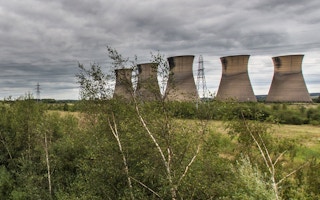The United States government has narrowed support for fossil fuels financing through multilateral development banks (MDBs) with a new policy that deals a blow to the development of new coal, oil and gas projects in Asia Pacific.
To continue reading, subscribe to Eco‑Business.
There's something for everyone. We offer a range of subscription plans.
- Access our stories and receive our Insights Weekly newsletter with the free EB Member plan.
- Unlock unlimited access to our content and archive with EB Circle.
- Publish your content with EB Premium.
Announced on Tuesday, new guidance from the US Treasury Department advises MDBs to end to all types of fossil fuel-based energy financing, unless clean alternatives were “unfeasible”.
The US is a major shareholder in development banks including the World Bank and Asian Development Bank, which fund major energy projects around the region.
The guidance opposes all new coal and oil development, except for oil projects needed in a crisis or as backup for off-grid renewable energy.
In a move that marks a shift in government policy that previously promoted US gas exports and infrastructure, the Treasury ruled out backing upstream natural gas projects, such as exploration overseas.
However, it remains open to supporting midstream and downstream gas projects in poor and fragile nations, on the provision that there is credible evidence that there is no clean energy alternative, and the project is necessary for energy security.
In the guidance, the Treasury said the US recognised that it is “incumbent” on advanced economies to limit fossil fuel use domestically “to send a strong message to international partners”.
The policy puts pressure on major Asian powers to make similar moves away from fossil fuels ahead of COP26, key United Nations climate talks in November. China, Japan and Korea are among the world’s biggest funders of fossil fuels financing in Asia, where most of the world’s new coal-fired power plants are being built.
Grant Hauber, energy sector analyst for Energy Economics and Financial Analysis (IEEFA), a think tank, noted that in the run-up to COP26, Japan and Korea in particular will be pressured to either reassess their positions on fossil fuels financing or explain why they are continuing to push these projects.
By funding fossil fuels projects in countries such Bangladesh, Indonesia, Pakistan, and Vietnam, the Asian triumvirate is creating long-lived, high-emitting assets that lock recipient countries into foreign currency-denominated costs with plants that may have high long-term operating costs, Hauber said.
“It is difficult to justify this kind of ‘aid’ as ‘economic development,’” he said.
While the US policy signals the latest move away from international fossil fuels financing, it leaves “fuzzy wiggle room” for natural gas inside MDBs, commented Hauber.
Gas made up for over three quarters of fossil fuel funding from MDBs in 2020, according to a study by Christian Aid. The US is the world’s biggest producer of natural gas, which produces lower emissions when burned than coal and oil, but is still a powerful climate agitant.
The notion that developing countries have no alternative but to use gas to support base-load power generation is a similar argument that was previously used for coal, Hauber said. The policy presumes that developing countries’ power grids will evolve in the same way as industrialised countries’ grids did 100 years ago — fossil fuels base load, with renewables at the margins, said Hauber.
The policy does not account for advances in renewable power and grid management that are already available at far lower costs, he commented.
The guidance also is open to carbon capture, use and storage, and methane abatement projects.
The US announcement emerges the week after a report projected grave climatic consequences, particularly for developing Asian countries, unless reductions in greenhouse gas emissions were made immediately.
It also comes on the heel of news that the ADB was leading a plan to speed the closure of Asia’s coal-fired power plants and replace them with cleaner sources of energy in developing countries. ADB announced in July that is was aligning its energy investments with the Paris Agreement on climate change.










